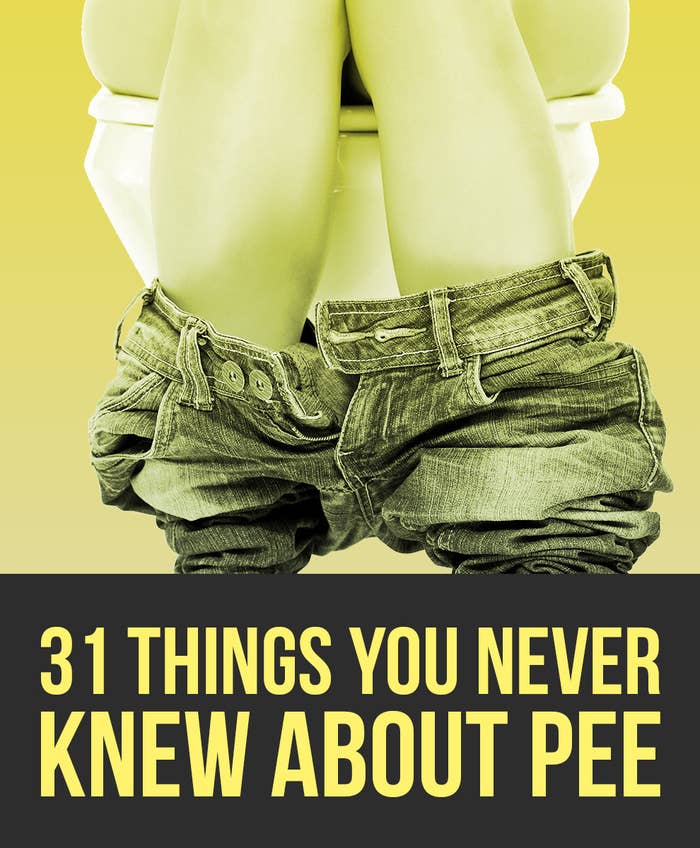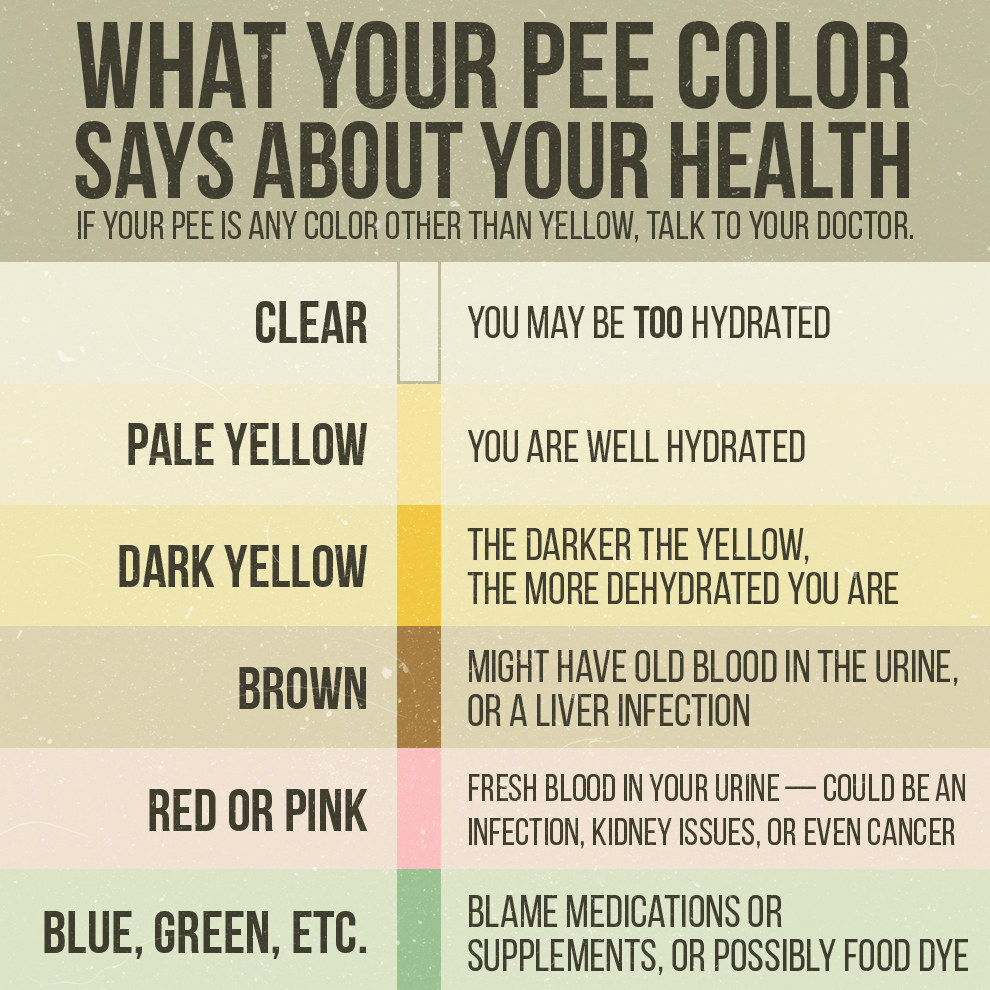
1.
Most people pee about seven times a day on average.
Of course, this varies a bit depending on how much you're eating and drinking, Dr. Benjamin Brucker, assistant professor of urology at NYU Langone Medical Center tells BuzzFeed Life. Don't worry if you go a little more or little less often.
2.
The average healthy pee stream should last for about seven seconds.
"That varies a bit from person to person," Brucker says, "but if you're peeing for only two seconds even though you felt like you really needed to go, that may indicate you have other problems like an infection." If that's the case, call your doctor.
3.
The average adult bladder can hold 300 to 500 milliliters of urine — enough to fill anywhere between 7 and 11 shot glasses.
And height doesn't actually play a role in bladder size, in spite of what you might have heard. In general, average bladder volume is pretty consistent across adults.

4.
Pee is one of the main ways your body gets rid of what it doesn't need.
Detoxing is real, and your urine is involved! "Urine is a waste by-product of food you eat, fluids you drink, and other things in your body, like medication," Brucker says. These things get broken down in your body, travel through your bloodstream, get filtered through your kidneys, and then leave your body in the form of urine.
Another waste by-product you know and love is poop.
5.
Urine comes out of your body via a tube called the urethra.
Urine accumulates in your bladder, and then you pee it out through the urethra. Women typically have urethras that are about 1.2 to 1.6 inches long, while men's urethras clock in around 8 inches.
6.
If you have a vagina, that is not where you pee from.
The urethra is a distinct tube from the vagina. That said, if you have a penis... that is where you pee from. #anatomy

7.
Your stream gets weaker as you get older.
You should enter any pissing contests before you go gray. As men age, their prostates get larger, potentially obstructing the urine stream and making it less forceful. A weaker pee stream isn't as much of an issue for older women, but it can still happen because the lining of the bladder and urethra become less supple, Dr. Inderbir Gill, founding executive director of the USC Institute of Urology, tells BuzzFeed Life.
8.
You also have to pee more often when you age.
As men get older they naturally make less testosterone, while women's production of estrogen dips. All these changes can also result in older people needing to pee more often than they used to.
9.
Pee is not actually always sterile.
"Urine has been generally thought to be sterile, but it actually can get infected," Brucker says. A 2014 study backs up this newer school of thought.
"In the same way you can take stool cultures and there may be bacteria, there may be some sort of bacterial flora that exists normally in the bladder," Brucker says. If you drink your pee (because... you are stranded in the desert with no potable water in sight?), that bacteria could just make a bad situation worse. "I wouldn't recommend it," Brucker says.
10.
The color of your pee can say a lot about your health.
The different colors can immediately tell you whether you're getting enough water, or that there could even be something else going on, Gill says. Stare into the bowl for some answers, and use this key as your guide.
Clear: You are super hydrated. Possibly even over-hydrated.
Pale yellow: You're drinking enough water. Keep up the good work!
Dark yellow: The more concentrated the yellow gets, the less hydrated you are. Seeing honey or marigold tints? Focus on drinking more water so your body can do its thing (you know, keeping you alive and healthy) to the best of its ability.
Brown: There might be old blood in your urine, or you could have a serious liver infection.
Red or pink: This is a sign that there's fresh blood in your urine, which is a warning of infection or potentially something more serious, like kidney issues or even cancer.
Blue, green, orange, or some other rainbow color: It's rare that normal amounts of any food of will change the color of your urine, Gill says. Instead, chalk these up to medications or supplements, or in much less common cases, food dye.
If you see anything other than yellow (or if you see consistently bright yellow even if you drink a ton of water), it's a good idea to call your doctor.

11.
Watch out for cloudy or foamy pee.
"Cloudy urine is primarily concerning because it can signal infection," Gill says. It's also a potential tip-off to sugar in your urine, which could indicate diabetes, or protein, which is a sign that your kidneys are leaking things that shouldn't end up in that bowl. As a one-off, foamy pee isn't necessarily concerning. But if it's regular, it could be due to the same causes as cloudy urine and you should make an appointment with a medical professional.
12.
Foul-smelling pee is a sign that something's off.
If your pee smells awful even though you're staying hydrated and haven't been consuming things that usually result in an odor, it could be a sign that you have an infection. It's also possible that your kidneys are accidentally spilling glucose or protein into your urine, Gill says.
13.
And sweet-smelling pee is often a sign of diabetes.
Peeing all the time could be a sign of diabetes in children, but in adults, that's less likely. Instead, the hint could be in pee that has an unusual sweet smell. That's because diabetes might cause glucose to leak into your urine, according to Brucker.
14.
Some things you eat and drink can make your stream especially stinky.
Food and drink like garlic and coffee can affect how your pee smells, but the effect is much less obvious if you're staying really well-hydrated, Gill says.
15.
The acids in asparagus actually make everyone's pee smell the same.
The difference is that only some people have the smell receptor to pick up on the funk, Brucker says.

16.
Leaking a little pee when you laugh, sneeze, or exercise is known as stress urinary incontinence.
And it's annoying, but often fixable, or at least manageable. "Kegel exercises are a good place to start for people that are having issues with small amounts of leakage," Brucker says. "Some people benefit from more involved physical therapy and others require surgeries to fix this problem. Using the toilet before exercising can help reduce the amount of leakage as well."
17.
Stress urinary incontinence is especially an issue for older women.
"Some literature says 40-50% of American women over age 50 have some degree of stress incontinence," Gill says. This is because older women have often gone through various pregnancies and vaginal deliveries, which can weaken the muscles that help keep pee inside you until you're ready to go. "It's actually quite rare for men to have unless they've had their prostate removed," Brucker says.
Either way, it's definitely common and also nothing to be ashamed of. "A visit to the doctor is much better than suffering in silence," Gill says.
18.
Holding in your pee isn't usually dangerous.
It's highly unlikely that you'll screw up your health if you occasionally put off going to the bathroom. Still, going every few hours is better than holding out, because theoretically it could cause infection. "It's how a moving stream is usually cleaner than a stagnant puddle," Brucker says.
19.
Oliguria is a condition where you don't pee enough.
If you pee less than 400 milliliters per day (about nine shot glasses), you should up your water intake. If you still aren't peeing more, see a doctor to find out if something's going on medically.
20.
Pee shyness is a thing.
It's called parauresis, and it's characterized by an inability to pee when other people are around. "If this is a cognitive hangup, behavioral therapy can be useful," Brucker says. "For other people, relearning how to relax the pelvic floor is critical and this is usually accomplished with physical therapy and another kind of therapy called biofeedback."

21.
Burning or pain when you pee is another sign to get yourself to the doctor ASAP.
An uncomfortable pee is like your body waving a "pay attention to me!" flag. "Painful urination can be caused by an infection of either the kidney, bladder, or urethra. When bacteria gets in these areas, it causes inflammation which causes pain," Dr. Michelle Lubetzky, transplant nephrologist at Montefiore Medical Center and assistant professor of Medicine at the Albert Einstein College of Medicine in the Bronx, New York, tells BuzzFeed Life.
One annoying example of this is urinary tract infections (UTIs), which can lead to a kidney infection when left untreated. You could also be dealing with a condition called pelvic floor dysfunction, which throws your nerve receptors off and can result in some aches while you're on the toilet, Gill says. See a doctor for a urine culture and potential further testing to diagnose the issue.
22.
STIs can also cause painful urination.
"Sexually transmitted infections can result in urethritis, which is an inflammation of the tract that carries urine from the bladder out of the body," Lubetzky says. In this case, inflammation = major pain. This is most often seen with the STIs gonorrhea and chlamydia, and guys usually experience the pain more often since women are more likely asymptomatic.
23.
Overactive bladder can make you feel like you have to pee 24/7.
This happens when your bladder contracts when it shouldn't, sending the message to your brain that you really need to pee, Gill says. There are various potential causes, like an infection that's made the bladder too sensitive, neurological issues (the bladder and urethra have nerves from the spinal cord, which connects to the brain), and kidney stones.
No matter the cause, the bottom line is that you should head to a doctor if you feel like you always have to go.
24.
Being pregnant can also turn you into a peeing machine.
If you've ever known someone who's been pregnant or even carried a baby yourself, this won't come as a surprise. "The actual uterus and fetus can sit on or push against the bladder, making it functionally much smaller," Brucker says. "There are also changes to blood volume and kidney function during pregnancy that might make women produce more urine."
Hormones might also have an effect. "Progesterone is thought to be a bit irritating to the urinary tract. As levels rise, this may make women feel as a they need to urinate more frequently," Brucker says.

25.
You should definitely pee after sex, especially if you have a vagina.
There's natural bacteria in the vagina that, during sex, can get pushed into the urethra toward the bladder and cause infection. Peeing flushes that out, Gill says. And although women are more likely to deal with the awfulness of UTIs, it's smart for guys to pee after sex, too.
26.
You really should sit your butt down on that public toilet seat, if you pee sitting down.
You might be tempted to hover over public toilet seats when you pee to avoid making skin-to-skin contact with germy surfaces. First of all, it's not necessary thanks to the minimal chances that you'll actually catch something from the toilet seat.
Plus, it might make it tough to actually whiz out all that waste. "It is harder to relax pelvic floor muscles when hovering, therefore the seated position is probably preferable," Brucker. So it's not necessarily that hovering increases any long-term risks, more that it's best to fully empty your bladder each time you pee.
27.
Urine contains about 3,000 components — but it is mostly made of water.
According to one 2013 study. "Urine is about 95% water, about 3% urea, which is a compound created by your body's breakdown of proteins, then some sodium, creatinine, potassium, and chloride," Lubetzky says. "There are also smaller amounts of other compounds at much lower concentrations."

28.
You can literally pee out kidney stones when they're small enough.
"Kidney stones are hard mineral deposits found in the kidney or urinary tract, and they affect 10-15% of the population. In many cases, they are small enough that they will pass without causing any problems," Lubetzky says. "Passing," FYI, means peeing them out. "Passing of a kidney stone is usually managed with pain control and good hydration," Lubetzky says.
Signs you might have kidney stones: "[They] typically present with back pain that travels to the groin area," Lubetzy says. Kidney stones can also cause painful urination or blood in your pee. If you're noticing any of these signs, see a doctor to find out what's going on.
29.
Sometimes kidney stones AREN'T small enough to pee out... and then they cause blockages and major pain.
"If [kidney stones] grow to be more than 3 millimeters or so, they cause blockage of the ureter which connects the kidney to the bladder. This can be quite painful," Lubetzky says. If you can't pass the stone, it might stop the flow of urine, which can boost your chances of infection. At that point, you should definitely see a doctor who can help break it up so you can pass it, then flush it away for good.
30.
Don't worry about peeing during orgasm.
Your body makes it pretty hard to do. Unless you're dealing with regular incontinence, the bladder neck closes during orgasm for both men and women. For men, that means semen can't flow back into the bladder and cause any issues. For women, it's reassurance that you can ignore that tell-tale "I need to pee!" feeling when you're close to orgasm, because it could just be a result of all that amazing stimulation. Unless you haven't gone for hours and it feels really urgent, feel free to go with the flow—of pleasure, that is.
One caveat to this, though...
31.
New research shows that *squirting* during sex is actually mostly pee.
Not that there's anything wrong with that. Look, if it feels amazing and your partner is into it, you do you.
